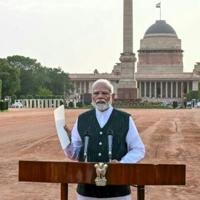Indian Prime Minister Narendra Modi is set to take the oath of office for a third term in power on Sunday, along with coalition allies, following his party’s failure to secure a parliamentary majority.
Modi’s Hindu-nationalist Bharatiya Janata Party (BJP) won 240 seats in this year’s election, falling 32 seats short of a majority in the 543-member lower house, marking its weakest performance in a decade.
Now, the BJP is dependent on a variety of minor parties to govern, with larger parties demanding significant concessions in exchange for their support.
Details of Modi’s new cabinet are yet to be revealed despite days of negotiations since the election results were announced on Tuesday.
With the 15-member coalition, National Democratic Alliance (NDA), the government will have a total of 293 seats.
Here are the key coalition partners that Modi will be working with during his third term:
– Chandrababu Naidu: from jail to kingmaker –
Chandrababu Naidu, a veteran politician and three-time state chief minister, was imprisoned for two months last year on charges of misappropriating $44.5 million in public funds allocated for unemployed youth.
Naidu, head of the Telugu Desam Party (TDP) in Andhra Pradesh, which holds 16 seats in the next parliament, denies the charges and was released on bail last October due to health reasons, although the legal case against him continues.
Naidu, known for his political acumen and bargaining skills, began his career with the Congress party before aligning with the BJP. His future role in Modi’s government remains uncertain.
– Nitish Kumar: Fair weather friend –
Nitish Kumar, the chief minister of Bihar, leads the Janata Dal (United) party, the BJP’s second-largest ally with 12 seats in the upcoming parliament.
Kumar, known for his unpredictable political maneuvers, has switched alliances between the BJP and opposition groups to suit his interests. Despite being a part of the opposition alliance initially, he switched sides to support Modi before the elections and is believed to be seeking a senior ministerial position in exchange for his party’s support.
– Shiv Sena: Ideological bedfellows –
The Shiv Sena, a Mumbai-based party with a Hindu-first agenda, split into factions last year due to political disputes in Maharashtra. A faction led by Eknath Shinde, the chief minister of Maharashtra, supports Modi’s party and holds seven seats in the new parliament.
With support from TDP, Kumar’s party, and Shiv Sena, Modi barely has a majority to govern in the upcoming parliament. Several smaller parties with a single seat each are also aligned with the BJP, ensuring a total of 21 seats above the majority mark.
pzb/gle/pjm/mtp





